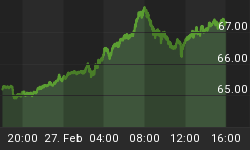The Japanese Yen rose on Thursday as investors shifted assets out of the troubled Euro Zone on renewed budget turmoil in Greece. A spike in the cost to insure Greece's sovereign debt triggered a flight to safety rally which fueled a turnaround in the Yen after earlier weakness. News that a similar situation is developing in Portugal also contributed to the Yen's strength. The Euro fell to it lowest level against the Dollar as the news broke.
Traders had been cautiously removing risk from the Euro the past couple of days after a report earlier in the week showed great interest in a possible bailout bond issuance from Greece. Today's action indicates that the situation is growing worse and that the Yen may soar at the expense of the Euro over the short-run.
After trading relatively flat in the hours before the New York opening, the U.S. Dollar strengthened close to midday as investor sentiment shifted back toward safety. Late yesterday and overnight, the Dollar appeared to be ready to weaken as demand for higher risk assets began to pick up following upbeat news from the Fed and a well-received speech from President Obama.
Shortly before the New York opening, news began to leak about Greece debt concerns causing the U.S. stock market to sell sold off. The release of less than stellar U.S. economic reports triggered additional selling pressure as investors pared equity market positions in anticipation of an economic slowdown. This rattled traders who then began selling higher price assets while seeking safety in the lower yielding U.S. Dollar and Japanese Yen.
The EUR USD traded under pressure throughout the session while taking out sell stops under the psychological 1.40 level. Today's selling pressure was been triggered by news that Greece's budget woes have resurfaced, sending the price to insure its debt against default to a new high. For several days, traders had become complacent while under the belief that a new bond issuance would make the Greek debt problems go away. 1.3800 remains the most likely downside target.
The British Pound traded lower but remained inside of its five day range. It's hard to tell at this time which direction investors prefer. Fear, and demand for lower risk is likely to drive the market lower. Renewed confidence in the economy could limit losses or fuel the start of a rally.
Demand for safer assets helped turn around the USD JPY, erasing earlier gains. During the wee hours of the morning, the Dollar was rallying versus the Yen after completing a 50% retracement and a closing price reversal bottom. The catalyst for the rally was an upbeat statement by the Fed and optimism generated by Obama's speech. A sell-off in U.S. equity markets and budget problems in Greece and Portugal, however, sent traders scrambling for safety, sending the USD JPY lower. This currency pair is probably the best indicator as to how bad the situation is between Greece and the Euro Zone.
Overbought conditions and profit-taking helped to pressure the USD CAD early but the sell-off in U.S. equity markets changed risk sentiment, triggering an intraday reversal. Look for the Canadian Dollar to feel pressure as long as investors continue to shun risk. Lower crude oil and gold are also contributing to the strength in the USD CAD.
The USD CHF held on to early gains after an overnight rally took this market through the December high at 1.0507. A new main bottom has been formed at 1.0367. This market is rapidly approaching overbought status and could begin a correction at any time. Watch for a closing price reversal to signal the formation of a top. Weakening gold and the possibility of an intervention by the Swiss National Bank are the fundamentals driving this market at this time.
The intraday break in U.S. equity markets triggered a break from the high in the AUD USD as traders dumped risky assets. A similar situation developed in the NZD USD as traders became more risk averse and decided to re-enter on the short side of the market or liquidate losing long positions. Watch for volatility over the next few days in the Aussie as traders positions themselves ahead of the next Reserve Bank of Australia meeting on February 2nd. Conditions have changed since the last meeting which makes it look like a safe bet that the central bank will not hike interest rates for a third consecutive time.















